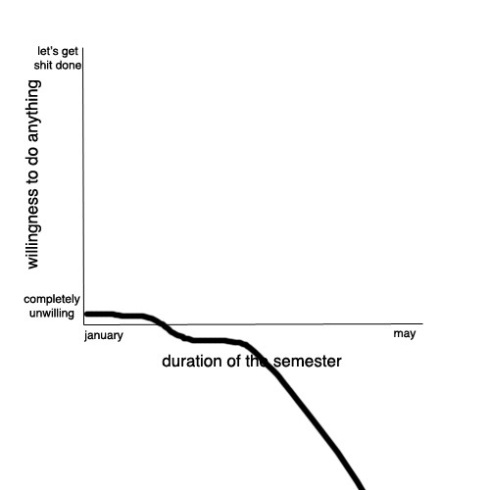I do apologise for the lack of blog posts on my page lately, but I have been busy with my exams, and then taking a break and sorting things out like getting a much needed haircut and fixing out this ingrown toenail that got deliciously infected (not really actually that delicious).
In that time, I reflected back on the time which I had spent in my classes, and got into a discussion with one of my friends, which ended up having us talk about university lectures and how useful they really are. The ideas from this discussion and the subsequent ideas which have formed in my head is the issue which I want to discuss in my blog post today.
Are university lectures really an effectively universal form of learning across all departments/faculties?
Drawing back on my previous experiences of classes, I have to say that having lectures for a lot of departments is not an effective mode to have students properly learn the content of a subject. Although I am a student studying a Bachelor of Arts with majors in Linguistics and Asian Studies, I did spend my first year taking Psychology and Biology units, so I have a few different disciplines to draw my experiences from.
Firstly though, I am going to talk about the Japanese units I took at university. I am taking a break from Japanese for a semester to teach myself the language without the obligations of having assessments for it, but that point aside, the Japanese units have lectures. A. Language. Had. Lectures. And to make it even worse, the lectures were marked as attendance (probably because they knew everyone was asleep during the lectures or on the internet on their laptops not even paying attention, or just dying inside).
Now I can imagine these lectures are important for presenting house-keeping messages about the department to students. BUT. This is the digital age where a lot of things are done online (including most of my university learning). If something is THAT important to be presented to students, then a post will be made on the university’s online learning area. And if people aren’t directed towards their student enough to check the online learning area to receive a message, then that’s their own fault.
I remember in first year in biology I would sit in my lectures taking notes, but in a scientific setting it was more appropriate for me to attend the practicals and spend a couple of hours hands on, using all of my senses to learn about how this part of the body worked, and the chemical reactions involved. In the lectures I would just end up staring blankly at a wall for 20 minutes (or playing temple run 2), trying to absorb all these facts that barely even strung together properly. THEN when it came to genetics and the lecturer was trying to explain how to solve genetics question problems by having a projected screen up, and not writing things down whilst going through that example, I just cringed. Lectures are certainly not a good way to learn if you have to solve problems (I can only imagine what it is like for those taking engineering who are learning advanced calculus from a lecture….). Furthermore, if you are remembering a list of facts or a process like the Krebs cycle, it is also not an effective way.
One of my highly intelligent (and pretty awesomely fabulous) friends who I caught up and spent time with this semester ( Her blog – http://eternalwayfarer.blogspot.com.au/) who is studying medical subjects (e.g. biochemistry, pathology, immunology, anatomy) has mentioned to me that lectures have not been the most effective way for her to learn the content in her subjects. In her anatomy subject she was just bombarded with a lot of information that could not be easily connected and were not ready connected. She purchased a colour-in anatomy book, and that was a much more effective way for her to remember places of structures inside the body. Furthermore, she also stated that in subjects on biochemistry, pathology and immunology, there are a LOT of processes to understand. To best understand these processes and how they work interconnectedly, mind-maps and self learning are a much more effective method than dot-points being presented a lecture.
She also agreed on lectures being useless for languages. She had taken Japanese in first year, and took German this semester (from what I’ve seen she’s pretty well spoken at German), so has had some experience to draw from. As aforementioned, Japanese had lectures, and they were an atrocious way to “learn” a language. Taking German though, it did not have lectures; only tutorials. And in those tutorials the learning was much more interactive with movies and discussions (we never do that in Japanese!!! *hmph*), and she commented, and I’m sure all of us agree, that it was a much more effective way of learning. Lectures have no places in learning a language. (Languages are a skill, you learn a language through constant USE of it, not just sitting there absorbing a bunch of slides in a second language like a sponge)
HOWEVER, a different story can be made from the Arts subjects I have taken this semester (Phonetics, Language and Power in Asian Societies, Chinese Studies: Culture and Empire). In these subjects which are humanities and social science subjects (except for probably Phonetics, which is a linguistics subject), the lectures can be told like a story and stringed together much more effectively. And in subjects like these, the assessment is based on the expression and cohesion of original ideas rather than the memorization of facts. So therefore, in a lecture in these subjects, you have a larger body of students’ ideas to consider and bounce off of and it is much easier to form a debate with someone else if necessary (which I’ve heard happen a lot in philosophy lectures). Plus, the way these lectures are formatted can keep you engaged and interested.
An alternative to this problem for science subjects could be replacing lectures with a 1-2 hour concept building class with 15-25 students. In these classes all that dry factual information can be presented in a way that is free from the constraints of a large theatre and powerpoint slides. A group of people can collaborate together and give to others their way of how they have connected a bunch of facts together, and are forced to engage to remember these ideas, instead of latently sitting in a theatre. Either that, or place more focus on the practicals, or provide appropriate resources for people to self-learn these facts outside of class.
In the case of language subjects; just get rid of the lecture.

It is not necessary. If the time in tutorials is used effectively where students practice their language and are engaged, then that’s good enough.
People are going to be asking me now, but what about my other obligations in life if I now have to attend another class?
Well, when you think about it, it is not really that much of a difference. At the worst, having an extra tutorial running a few times will give you some more flexibility with your timetable of being able to choose when to have that one to two hours. Furthermore, most science and biomedicine students who are studying full time have classes that make them have to go into university atleast few days a week anyway. And those running the class could find ways to make the content easier and interactive to memorise.
I know I haven’t yet considered in this blog post how it is cheaper for the university to just have all the students forced together into one lecture theatre with only one staff educating all the students. But, I can’t imagine the alternatives provided would cost too much more. Especially if it is just a group of postgraduate students taking a few Concept-Building classes each.
I know this blog post is a bit shorter than my other ones, but thank you for reading.
Effective learning is based on how we accommodate our available time just as much as how much time we accommodate.













